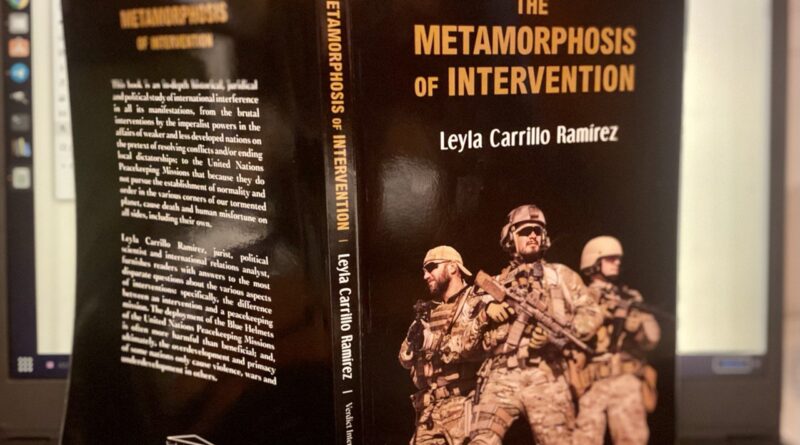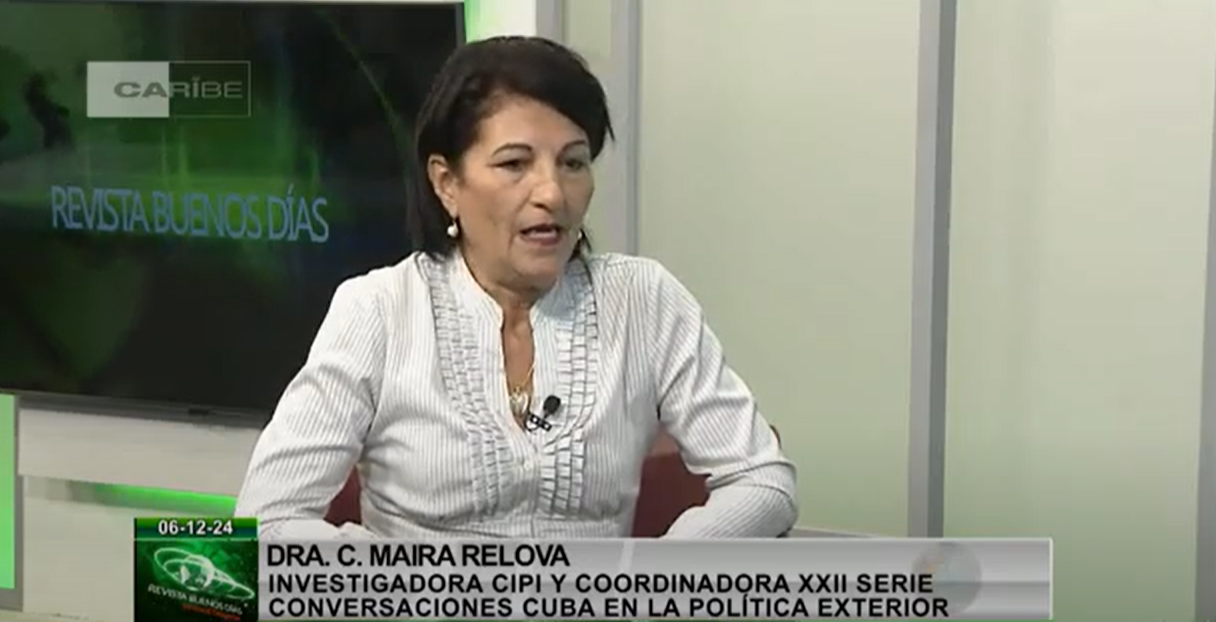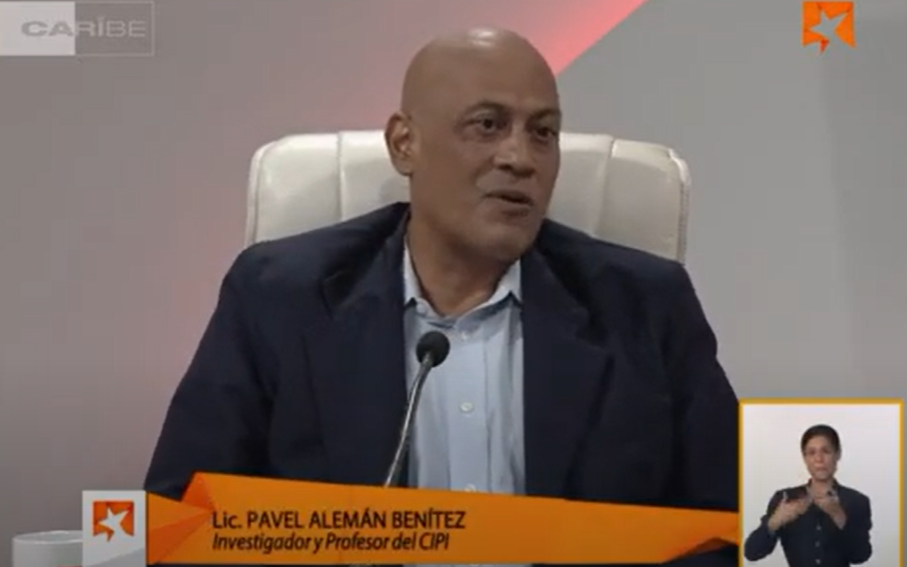Failed US Interference in Cuba was Contained by Cuban People – Interview with Leyla Carrillo Ramírez – ‘The Metamorphosis of Intervention’

Featured image: Photo of Leyla Carrillo Ramírez’ book “The Metamorphosis of Intervention” (Verdict International Press, 2020) with a laptop computer in the background. Photo: Orinoco Tribune.
In a new episode of Chavista Chronicles from Caracas, Orinoco Tribune had the pleasure of interviewing Cuban writer and thinker Leyla Carrillo Ramírez. She is based in Havana, Cuba, and in 2020 her book The Metamorphosis of Intervention was translated and publish in English by Verdict International Press.
Leyla Carrillo Ramírez is a researcher on global and European affairs at the Center for International Policy Research in Havana. She was an analyst at the Center for European Studies until 2010 and accomplished several diplomatic missions in European countries. She is a lawyer and doctoral candidate in political science, as well as a member of the Cuban Society of International Law in the National Union of Jurists and of the Cuban Association of the United Nations.
Leyla is the author of the books The European Union and Human Rights and The Metamorphosis of Intervention (reissued in English), and she is also coauthor of The problems of Security in the World and the European Union, the United States and Russia; its Convergences and Divergences in the International Context: a Look from Cuba. She has also published numerous articles in scientific, local and alternative media platforms in Cuba, Mexico, Ecuador, Argentina, the United States, France, Italy, the Holy See and Turkey.
In order for the interview to be conducted, the internet blockade on the island had to be bypassed, since it did not allow the use of Zoom, the video-conferencing tool used worldwide but is not operational in Cuba, in another consequence of the illegal US blockade.
Jesus Rodriguez-Espinoza, Orinoco Tribune’s editor, conducted the interview around four main questions:
1- How have “humanitarian interventions” and “responsibility to protect (R2P)” affected Cuba in recent years?
For Leyla Carrillo, and for Cuban, interventionism has been in force since the struggle in the 19th Century against Spanish colonization, but more so since the triumph of the Revolution in 1959. The concept of “ripe fruit” has remained constant, which would inevitably fall into the hands of the United States (or its allies), which in the case of Latin America the US considers it “its backyard.” Of course, these interventionist methods have varied over the decades and, unlike when they encouraged coups during the 20th century, today they apply more modern methods, such as regime change, humanitarian intervention and, to a smaller scale, the Responsibility to Protect (R2P), which has been more frequent in the African continent.
The Cuban writer continues:
This trend of Humanitarian Intervention in Cuba had its debut in November 2020 and intensified during the riots in July 2021, which found a propitious framework during the most difficult stage of the COVID-19 pandemic and as a direct result of the increase and expansion of more than 240 sanctions imposed against Cuba by the administration of Donald Trump and maintained during the government of Joseph Biden. Undoubtedly, the intensification of the blockade exacerbated the shortages, uncertainties and inability to purchase, imposed since the 1960s when President Dwight D. Eisenhower proclaimed his decision to “surrender the Cuban people through hunger and desperation,” so that fought against the Castro government.
The proliferation of campaigns through social media platforms called, from Miami, for rebellion, riots and disturbances, under various slogans, including SOS Matanzas, at a time of expansion of the pandemic in that province. The plan failed and was contained with the help of the people and the country’s institutions, against all expectations of those who encourage subversion and debauchery.
Of course, the purposes of intervening in Cuba did not cease and precisely at this time the same actors increased financing to certain sectors of the population and sponsorship to protest groups, under the banner of SOS Cuba, SOS Holguín or SOS Ciego de Ávila; while critical health, economic, and social problems were and still are on the rise in many countries, including the United States.
The Responsibility to Protect is a figure derived from the request of the government of a country or that accepts that others try to solve internal problems that it cannot tackle by itself. Unfortunately, more than sixty countries have accepted the R2P, which violates their sovereignty and self-determination. In our case, ever since the struggle against Spanish colonialism in the 19th century, Antonio Maceo, who was on of the two greatest generals, said, and I quote, “whoever tries to take over Cuba will collect the dust from its soil drenched in blood, if he does not perish in the struggle”. That decision is still in force: we do not ask for help, and we do not accept foreign military interference either.
2- Does “The Metamorphosis of Intervention” have anything to do with what is happening in Ukraine in recent months?
Carrillo explained to us that her book The Metamorphosis of Intervention can be related to any interference in the internal affairs of any country. She told us that in this context the conflict in Ukraine was anticipated by many analysts as far as the West in its geopolitical strategy labeled Russia and more recently China as “the enemies.”
In this perspective she emphasized that the conflict in Ukraine should be viewed from two different angles:
• The imperialist poles of power (through government statements and media or internet campaigns) accusing Russia of attacking Ukraine, insulting it, sanctioning it and excluding it as an international actor, instigating its decline and elimination.
• Russia, harassed by the United States, NATO and the European Union, foresaw and warned about the danger of the fence around its borders, which represents an existential threat. Meanwhile, the genocide perpetrated for 8 years by far-right forces in the Russian-speaking area of Donbass and silenced by Western actors, served as the framework for the Russian attack on that region.
3- Do you think that new cold war or missile crisis scenarios could be replicated in Latin America within the context of the Ukrainian Conflict?
The Cuban writer stressed that in her book she maintains that “interventionist strategies are as long-lived as the history of humanity, increased since the emergence of the nation-state. The strategist Von Clausewitz argued that war constituted the exercise of politics ‘by other means.’”
Since then, she continues, “interventionism has been adapted to the interests of the hegemonic countries, at each specific moment and is implemented through wars of conquest, assaults and invasion, the modification of borders, aggression, the exercise of militarization and extraordinary actions against the law or having these actions protected by conceptions not agreed by International Law, like extraordinary executions, mass extermination and genocide, armamentism, paramilitarism, state, biological and media terrorism, among other methods, expressing the threat and use of force [is a terrible thing to do].”
“The threat of intervention in Latin America or the Caribbean is latent because we inhabit a continent full of natural resources that the great powers seek to dominate, from California to Antarctica, and any movement, political party or action that challenge the imperial domination worries the great corporations, transnationals and governments, not just Washington. The prolonged and strengthened harassment against Cuba, Venezuela and Nicaragua confirm this,” she added.
For these reasons she believes that, “it can be seen, whether in the Middle East, Africa, Asia-Pacific or Latin American and Caribbean, interventionist threat is part of the geopolitical strategy to dominate the world. Europe appears absent from this plan, but in reality the conflict in Ukraine could also be used to expand other kinds of “initiatives” happening all around over the world.
4- How are the strategies of imperialist countries linked to try to reverse the consolidation of a new international order that is starting to emerge, according to the opinion of the majority of international analysts?
In this field Leyla Carrillo said that “the most powerful countries and their allies have not resigned to the fact that the processes of change in the world and the correlation of these forces are tilted in favor of the majority, and much less, to the impetus of emerging powers that also represent the majority of the world’s population.” This in order to preserve their interests and reverse the unavoidable emerging new world order.
“The strategies pursued by those countries interrelate, increasingly, to reshape the world. This is expressed in their agreements within the framework of the Transatlantic Alliance between the United States and the European Union, in the Group of 7, in the Davos Forum, in the EU and NATO Summits, in the Organization of American States, the International Monetary Fund and the World Bank, among others, where intrusive agreements are adopted,” she added.
Carrillo concluded her answer stressing that she dared to repeat what is stated in her books Metamorphosis of Intervention and Security and Terrorism in the 21st century saying that, “intervening is meddling, and interfering in the lives and decisions of others, while only taking into account the formulas applied by the most powerful countries and groups to achieve their objectives against the people’s wishes.”
In this sense Orinoco Tribune’s editor added that in this particular topic he felt compelled to mention the “multistakeholder scheme” being discussed in recent years by many experts in international relations where the relevance of the nation-state as we know it in the decision making process within international organizations is being diminished to open the door to big corporations in an attempt to equalize both entities and maybe eventually leave most decision making processes in the multilateral and international level in the hands of corporations.
In this field he mentioned United Nation’s Gavi, the Vaccine Alliance (previously the GAVI Alliance, and before that the Global Alliance for Vaccines and Immunization) as a terrible example in that direction that became more visible during the COVID-19 pandemic as Gavi was the real power behind the COVAX mechanism designed by the United Nations to allegedly distribute vaccines among the less wealthy countries in the world.
Both Carrillo Ramírez and Rodriguez-Espinoza agreed that this trend is alarming and also involves many different aspects of life like technology, environment, mercenaries (euphemistically called private armies or contractors). If not stopped in time, it could put the fate of the world in the hands of corporations whose only interest is to maximize their profits profits.
Before concluding the interview and thanking Leyla Carrillo for her participation, Rodriguez-Espinoza mentioned three issues that came to his mind during the development of the interview:
• The first was related to the clear intention of regime change by NATO against Russia with the final objective of taking back control of Russia. There we saw, which is key, the lapsus mentis of US President Joe Biden at the end of a speech in Warsaw, Poland, at the end of March, saying that Vladimir Putin “cannot remain in power.” This connects directly with the nature of Carrillo’s book about interventionism and might have a real impact in the development of the conflict in Ukraine.
• Secondly, the racist component of the conflict in Ukraine has, in the words of Rodriguez-Espinoza, played a key role in the conflict, as many in Europe and the United States embrace racist and supremacist ideology that always have seen the Slavic ethnic group as inferior and might be rejoining themselves due to the fight among two very important Slavic nations, Russia and Ukraine. Here Carrillo mentioned that one of her areas of interest is migration and that she is working in a new book about this issue where racism and supremacy is very connected to migration.
• Lastly, the editor of Orinoco Tribune, mentioned that another aspect that might need more attention in the analysis of leftist experts should be the fact that Russia did not use the excuse of “Responsibility to Protect” (R2P) to initiate its military operation in Ukraine, disregarding the fact that it is clear there was a humanitarian crisis affecting residents of the Donbass region after eight years of Ukrainian bombarding and ethnic cleansing, and of course there was, and still is, an existential threat for Russia as a nation coming from NATO and Washington. Vladimir Putin and the Russian Nation, while announcing the beginning of the military operation in Ukraine, chose Article 51 of the UN charter to provide legal background to it. Article 51 allows countries (individually or collectively) to defend themselves in the case of armed attacks until the Security Council take necessary measures to restore peace.
Source: Special for Orinoco Tribune https://orinocotribune.com/failed-us-interference-in-cuba-was-contained-by-cuban-people-interview-with-leyla-carrillo-ramirez-the-metamorphosis-of-intervention/




Déjanos tu comentario